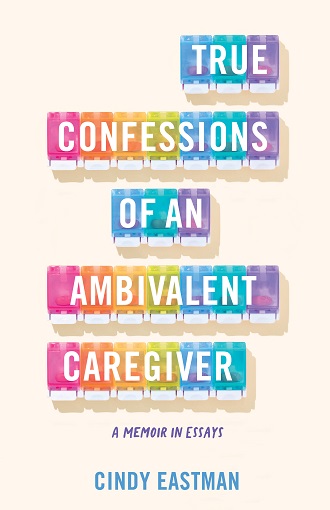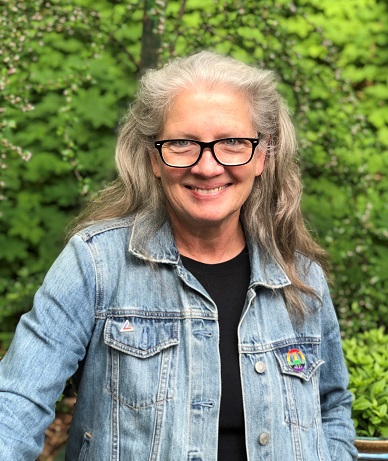Sharing the more unpleasant times and behaviors were difficult for me, although that’s the very reason I committed to writing it all down. I didn’t want to sugar-coat the experience.
Cindy Eastman – 21 September 2024
The Back Flap
Written for caregivers of parents and spouses, this funny but brutally honest collection of essays from award-winning author Eastman challenges the romanticized notion of caregiving, portraying it as an elegant conflict that reshapes family dynamics.
At first grateful to be able remodel the dining room of her family’s modest home in Connecticut to accommodate her eighty-six-year-old father for what everyone felt would be a short duration of care, Cindy Eastman ultimately experienced a whole gamut of feelings over the course of what turned out to be four years of caring for her dying dad. Caregiving impacts everyone, and this account—told in essays recorded before, during, and after the time Eastman’s father was with her—details that impact, not just on the primary caregiver but also the rest of the family.
One of the reasons Eastman committed to writing down her experiences was because she predicted that once her dad died, there would be a tendency to soften or even deny any of the negative and challenging times—and there were many. As of 2020, more than 53 million adults provide homecare in this country, and the reality of that arrangement is different for every family. It is not, as some might suggest, a “noble gesture” but rather an elegant conflict—an intricate reassembling of the family dynamic that many people don’t ever see coming. In these candid, often poignant essays, Cindy Eastman brings all the emotions of taking on the challenging responsibility of caregiving a parent at the end of their life to the surface.
About the book
What is the book about?
This is a memoir in essays about the time I was a caregiver for my dad, who came to live with my husband and me in our home. There are three sections; Before, During and After.
When did you start writing the book?
I began writing it pretty soon after Dad came to live with us. I post personal essays for my blog, so it was a seamless way to also begin to write about what all our lives were like once we agreed to take on this responsibility. I knew early on that I wanted to be sure to record what caregiving is really like because I felt like once Dad died, my recollection might be tempered by grief and time.
How long did it take you to write it?
I wrote most of the essays during the four years he was with us and then it took me another year or so to compose it into the format I wanted. Some of the essays from the “Before” section were previously written.
Where did you get the idea from?
I knew I would always write about my experience, but once I became more exposed to the challenges of caregiving, I decided to make it into a book that would—hopefully—be a guide for others in a similar situation.
Were there any parts of the book where you struggled?
Sharing the more unpleasant times and behaviors were difficult for me, although that’s the very reason I committed to writing it all down. I didn’t want to sugar-coat the experience.
What came easily?
Writing about the love and the respect I have for my dad and my whole family. Even though I focused on my own experience, my whole family was involved of course and I am grateful to have had their support.
Are your characters entirely fictitious or have you borrowed from real world people you know?
It’s all us!
We all know how important it is for writers to read. Are there any particular authors that have influenced how you write and, if so, how have they influenced you?
One early influence is Harper Lee for her writing style—her economy of words is brilliant. But anyone I’ve read has influenced me. I was a voracious reader as a child and into early adulthood. I read everything. More recently my TBR pile comes mostly from other She Writes Press authors, who constantly inspire and influence me.
Do you have a target reader?
Anyone who has had to be a caregiver is my target reader, although people who love and support caregivers might get something out of this story, too.
About Writing
Do you have a writing process? If so can you please describe it?
My writing process begins in my head and stays there until I’m in front of my computer or have a pen in hand and an open journal. I think a lot about my next topic or essay—over the course of days or even weeks, sometimes, my writing spends its pupal stage in my head and when I sit down to write it, it all comes out at once. It’s not always in great shape, but I do tend to get it all out in one sitting when I can.
Do you outline? If so, do you do so extensively or just chapter headings and a couple of sentences?
I don’t. I’ll sometimes use the Notes app on my phone, because invariably, a phrase or title will come to me when I’m driving or at a meeting and I’ll jot it down before I forget it.
Do you edit as you go or wait until you’ve finished?
I edit at the end. Sometimes I move entire paragraphs around, so it’s best for me to finish before I edit.
Did you hire a professional editor?
Before I submitted my manuscript, I hired a professional editor. There is so much that is discovered by a professional set of eyes that can’t be found by myself—particularly with memoir—it’s my story so I think I’ve been clear about certain situations, but an editor will find the places where clarification is needed. I always recommend hiring an editor whenever I’m teaching a writing class or workshop.
Do you listen to music while you write? If yes, what gets the fingers tapping?
No, I can’t. I’m too easily distracted as it is!
About Publishing
Did you submit your work to Agents?
Not this book, because I knew I wanted to go with She Writes Press (SWP). I have another book—an anthology—that I am submitting to agents.
What made you decide to go Indie, whether self-publishing or with an indie publisher? Was it a particular event or a gradual process?
I had such a good experience with SWP, that I knew I wanted to return. However, since publishing my first book with SWP, I feel that being a part of that community has given me such a good education, in terms of knowing the business a little better, I can go forward with my anthology knowing more clearly what my options are.
Did you get your book cover professionally done or did you do it yourself?
SWP has a professional design team that designs all their covers.
Do you have a marketing plan for the book or are you just winging it?
I have Booksparks managing my publicity and I am so grateful! I “winged it” with my first book and it is a lot of work. I am lucky to be working with such a professional and knowledgeable team this time.
Any advice that you would like to give to other newbies considering becoming Indie authors?
I’d say go for it. There is a lot of information available now about being an indie author. Not only information, but platforms, resources and choices that weren’t around even ten years ago. Certainly, I would recommend finding out as much as possible beforehand, but having the freedom to choose one’s own publishing path is a wonderful way to bring a book into the world. Especially one that’s someone has put their heart and soul into.
About You
Where did you grow up?
I grew up in Louisville, Kentucky in a subdivision called Brownsboro Farms. When I told that to the boys at college (in Texas) they thought I was an heiress to a thoroughbred breeder or something.
Where do you live now?
I live in Watertown, Connecticut with my husband and within easy reach of (some of) my grandchildren.
What would you like readers to know about you?
I suppose I’d like readers to know that even though I shared much about what was difficult about taking care of my dad, it’s a decision I’d make again. I’d also like people to know that writing about it was one of the ways that helped me get through it. I’ve been a writing teacher for many years now and one of the classes I have the most response to is my Writing Through Grief workshop. My goal for that workshop is to give people an outlet, both within a group and for themselves, to process their individual experiences with grieving.
What are you working on now?
Besides working at promoting my book, I have a couple of projects I’m working on now. One of them is for my daughter, who died from cancer this year. She was working on her own memoir, which I hope to finish for her. I’m also working towards publishing an anthology of grief for which I’ve collected an array of others’ stories and poetry. Anyone wanting to know more about any of those projects or read more of my work can visit my website at Cindyeastman.com
End of Interview.
For more from Cindy Eastman visit her website and follow her on Instagram and Facebook.
Get your copy of True Confessions from an Ambivalent Caregiver from Amazon US or Amazon UK.


